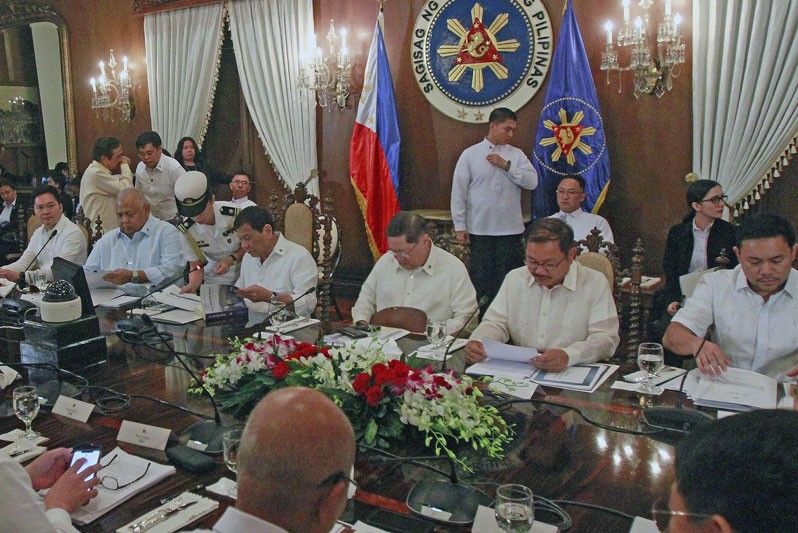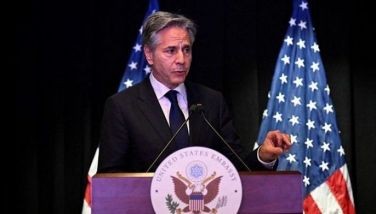Drug war refresher highlights Cabinet meeting

MANILA, Philippines — A refresher on the war on drugs as well as a clarification on the appointment of retired military and police officers to key positions highlighted President Duterte’s meeting yesterday with his Cabinet officials, presidential spokesman Salvador Panelo said.
Asked why the Chief Executive had to discuss with his official family the war on drugs, Panelo told reporters “not all the members of the Cabinet know the rationale behind” the administration’s centerpiece program.
Also discussed was the drug campaign’s impact on the people and on the overall security situation. He squelched insinuations that some officials had expressed misgivings about the conduct and direction of the campaign.
“Oh, definitely no. It’s more of information to them so that they will know how to explain when they are asked by reporters like you,” Panelo said.
Pressed on whether the continued proliferation of drugs, especially shabu, could be used to justify a nationwide implementation of martial law, Panelo said the President would “consider all factors” before seeking an expansion of martial law coverage.
But he stressed any decision on martial law would depend on recommendations from the Armed Forces of the Philippines.
“Well, as the President said, whether or not there will be lifting or extension of martial law will depend on recommendation of the Armed Forces of the Philippines – they being on the ground,” he said.
Malacañang earlier defended the President’s order to put the Bureau of Customs (BOC) under military rule, saying massive corruption at the agency was tantamount to a state of lawless violence.
Duterte declared martial law in Mindanao on May 23 last year at the outbreak of the siege of Marawi City by Islamic State-linked militants. Upon request of Malacañang, Congress extended martial law until yearend.
At yesterday’s meeting, Panelo said Duterte explained his appointment of former military and police generals to key government posts.
“He has been doing that all along. He has been making comments in giving rationale to his appointment of these military officers who have retired,” Panelo said.
He maintained that for the President, “military discipline” could get things done.
“I think so, because of their military discipline,” Panelo said, explaining the President’s preference for retired officers. “The culture of the military men is different from the civilians. They follow orders, they talk less and argue less… they just work. And they’re always on the go.”
HRW rebuffed
Also yesterday, Panelo scoffed at a proposal of the Human Rights Watch (HRW) for the creation of an independent commission to investigate the role of police officers in the killing of drug suspects.
HRW made the call in reaction to an admission by a police officer that some law enforcers working for drug lords were involved in extrajudicial killings.
“Its inference from an interview of a lone police official cannot be a valid ground for such reckless proposal. This is not new and is no different from those hurled by desperate critiques of this administration since Day 1 of the President’s war against illegal drugs,” he said.
“This proposal by the Human Rights Watch for the creation of an independent commission to go after police officers allegedly involved in the killing of drug suspects smacks of another effort of this moribund group, which projects itself as a human rights organization, to intrude into our domestic affairs,” Panelo said.
He said mechanisms exist that could help government address the problem with errant policemen. He cited the Internal Affairs Service of the Philippine National Police and even the Commission on Human Rights.
“These, among other governmental bodies engaged in counterbalancing measures, are functioning,” Panelo said.
In making the call, HRW “clearly aims to undermine the integrity of the government’s institutional mechanisms,” Panelo said.
“We need to correct the minds of our people from this misinformation that the group wants to propagate,” he added.
“We thus reiterate our position that we do not need schooling from outsiders on how to run the country,” he said.
Chief Supt. Debold Dinas, in a recent media interview, said policemen doubling as hired guns for drug syndicates were responsible for numerous killings in Cebu and other regions in Central Visayas after Duterte launched his war on drugs.
“The admission by a senior police official that police officers are working as hit men for drug syndicates is yet more evidence of Philippine government complicity in ‘drug war’ killings,” Brad Adams, Asia director of HRW, said.
“Given the total failure of the police to stop these abuses, it’s clear that any serious investigation of the police role in the war on drugs needs full independence,” he added.
Adams also pointed out that any probe body should be completely independent from the PNP and the Office of the President. “Its members should include investigators from the Commission on Human Rights and representatives of nongovernmental organizations with recognized expertise.”
Falsifying evidence
HRW investigations into several “drug war” killings revealed the pervasive involvement of police officers who routinely falsified evidence by planting weapons and illegal drugs on suspects’ bodies.
The group found that whether or not the unidentified assailants were police officers or agents of the state, the similarity of tactics used in the killings showed planning and coordination by the police and local civilian officials.
Reuters and other media organizations have also published investigative pieces that implicated police officers in “drug war” killings. Officials have repeatedly denied the claims of HRW.
In February, the prosecutor of the International Criminal Court (ICC), Fatou Bensouda, announced that the court would conduct a “preliminary examination” into killings linked to the “war on drugs.”
Bensouda said the ICC’s initial inquiry was based on allegations of “thousands” of deaths, many of which were linked to “extrajudicial killings in the course of police anti-drug operations.”
Despite the calls for accountability, not one police officer or government official has been convicted for any of these killings. Instead, the Duterte administration has attacked critics of the drug war, including Sen. Leila de Lima now behind bars on spurious charges.
“Chief Supt. Dinas’ suggestion that the police hit men are rogue officers doesn’t pass the laugh test. Duterte has made it clear over and over again that he wants drug dealers and users killed so there is no reason to think these are rogue operations,” Adams said.
“It’s time for an independent commission to be created to officially identify those responsible and begin the process of accountability for mass murder,” he added. – with Rhodina Villanueva
- Latest
- Trending




























